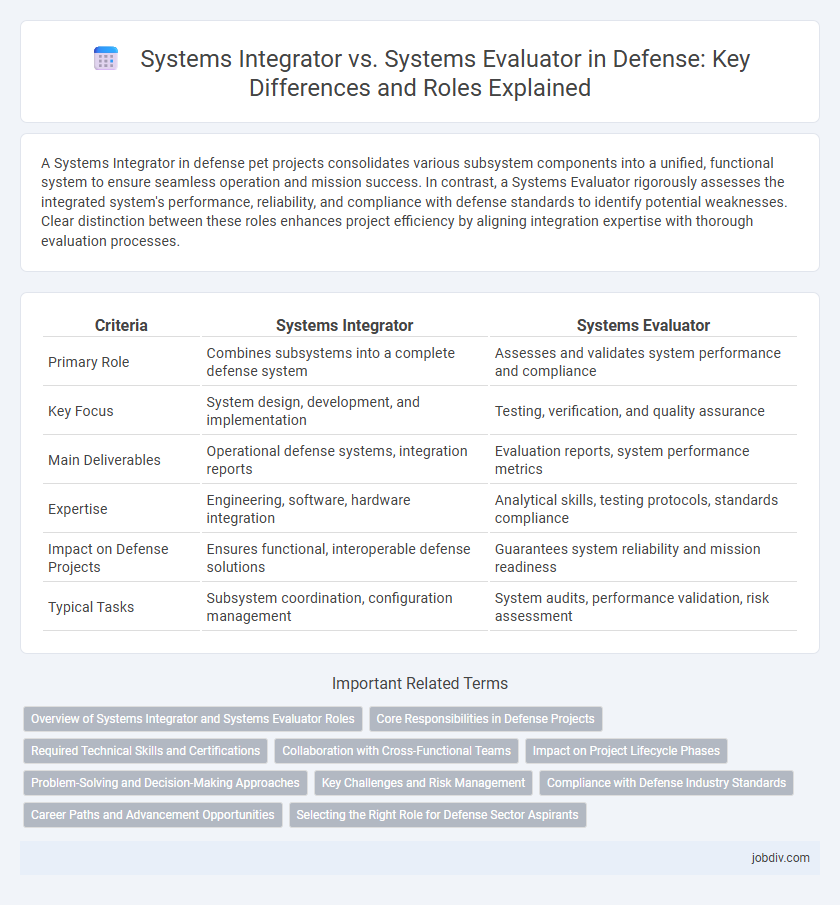A Systems Integrator in defense pet projects consolidates various subsystem components into a unified, functional system to ensure seamless operation and mission success. In contrast, a Systems Evaluator rigorously assesses the integrated system's performance, reliability, and compliance with defense standards to identify potential weaknesses. Clear distinction between these roles enhances project efficiency by aligning integration expertise with thorough evaluation processes.
Table of Comparison
| Criteria | Systems Integrator | Systems Evaluator |
|---|---|---|
| Primary Role | Combines subsystems into a complete defense system | Assesses and validates system performance and compliance |
| Key Focus | System design, development, and implementation | Testing, verification, and quality assurance |
| Main Deliverables | Operational defense systems, integration reports | Evaluation reports, system performance metrics |
| Expertise | Engineering, software, hardware integration | Analytical skills, testing protocols, standards compliance |
| Impact on Defense Projects | Ensures functional, interoperable defense solutions | Guarantees system reliability and mission readiness |
| Typical Tasks | Subsystem coordination, configuration management | System audits, performance validation, risk assessment |
Overview of Systems Integrator and Systems Evaluator Roles
Systems Integrators in defense coordinate complex subsystems into cohesive, operational defense platforms, ensuring interoperability and compliance with mission requirements. Systems Evaluators analyze system performance and reliability, conducting rigorous testing and validation against predefined military standards. Both roles are critical for delivering effective defense solutions, with integrators focusing on system assembly and evaluators on quality assurance and performance verification.
Core Responsibilities in Defense Projects
Systems Integrators in defense projects focus on combining various subsystems and components into a fully functional and cohesive system, ensuring interoperability and seamless communication among hardware and software elements. Systems Evaluators are responsible for assessing the performance, reliability, and compliance of integrated defense systems against specified requirements and operational standards. Both roles demand expertise in defense technology, project management, and rigorous testing protocols to guarantee mission readiness and system effectiveness.
Required Technical Skills and Certifications
Systems Integrators require proficiency in system architecture design, software development, and hardware interoperability, with certifications such as CISSP, PMP, or specific vendor credentials like Cisco CCNA to ensure secure and efficient integration. Systems Evaluators focus on skills in system testing, validation, and performance analysis, often holding certifications like Certified Test Engineer (CTE), CompTIA Security+, or ISTQB to validate their expertise in quality assurance and compliance. Both roles demand strong knowledge of defense standards such as DoD Directive 5000 and cybersecurity frameworks like NIST SP 800-171 for secure defense systems deployment.
Collaboration with Cross-Functional Teams
Systems Integrators coordinate closely with cross-functional teams including engineers, project managers, and logisticians to ensure seamless assembly and deployment of defense solutions. Systems Evaluators work alongside these same teams to rigorously test and validate system performance against operational requirements. Effective collaboration between Integrators and Evaluators enhances system reliability, mitigates risks, and aligns technical capabilities with mission objectives.
Impact on Project Lifecycle Phases
Systems Integrators streamline the design, development, and deployment phases by ensuring seamless interoperability among diverse subsystems, directly accelerating project execution and reducing integration risks. Systems Evaluators impact the verification, validation, and testing phases by rigorously assessing system performance against operational requirements, identifying deficiencies that inform critical modifications. Both roles are essential for mission success, with integrators enabling cohesive assembly and evaluators safeguarding functional reliability throughout the defense project lifecycle.
Problem-Solving and Decision-Making Approaches
Systems integrators emphasize problem-solving by coordinating diverse subsystems into a cohesive defense solution, leveraging multidisciplinary expertise to ensure interoperability and mission readiness. Systems evaluators focus on decision-making through rigorous assessment of system performance, reliability, and compliance with defense standards, providing critical feedback to inform strategic improvements. Both roles require adaptive thinking and analytical skills but differ in execution; integrators build and optimize, while evaluators analyze and validate.
Key Challenges and Risk Management
Systems Integrators face key challenges in coordinating diverse defense technologies into cohesive platforms while managing risks related to interoperability, supply chain disruptions, and evolving threat landscapes. Systems Evaluators must rigorously assess system performance, reliability, and compliance under operational conditions, mitigating risks associated with incomplete data, testing biases, and emergent vulnerabilities. Effective risk management in both roles requires continuous validation, cross-disciplinary collaboration, and adaptive strategies to address dynamic defense requirements and technological advancements.
Compliance with Defense Industry Standards
Systems integrators in the defense sector specialize in combining hardware and software components to ensure seamless interoperability while strictly adhering to Defense Federal Acquisition Regulation Supplement (DFARS) and National Institute of Standards and Technology (NIST) guidelines. Systems evaluators focus on rigorous testing and assessment processes to verify compliance with International Traffic in Arms Regulations (ITAR) and Military Standard (MIL-STD) requirements, ensuring security and performance benchmarks are met. Both roles are critical for maintaining conformity with evolving defense industry standards, safeguarding system reliability, and operational readiness.
Career Paths and Advancement Opportunities
Systems Integrators in defense focus on designing and implementing complex defense technologies, advancing through roles like project manager or chief engineer by gaining expertise in system architecture and cross-functional teamwork. Systems Evaluators specialize in testing and validating defense systems, progressing toward positions such as evaluation lead or compliance officer by mastering assessment protocols and regulatory standards. Both career paths offer opportunities in defense contractors, government agencies, and military organizations, with advancement driven by technical proficiency and leadership skills.
Selecting the Right Role for Defense Sector Aspirants
Defense sector aspirants must distinguish between Systems Integrators, who design and implement complex defense solutions by combining multiple subsystems, and Systems Evaluators, responsible for rigorously testing and validating these integrated systems for compliance and performance. Systems Integrators require strong skills in project management, technical design, and cross-disciplinary coordination, while Systems Evaluators focus on analytical expertise, testing protocols, and quality assurance standards. Choosing the right role depends on whether the candidate prefers hands-on system creation and deployment or detailed performance assessment and reliability validation within defense projects.
Systems Integrator vs Systems Evaluator Infographic

 jobdiv.com
jobdiv.com